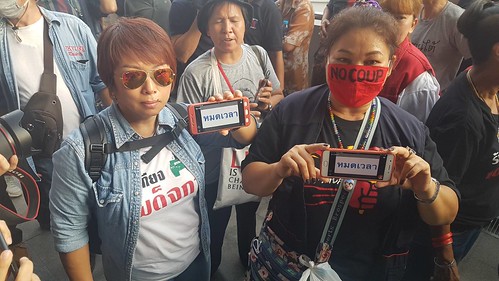Although the emergence of new political parties has brought excitement, controversies and hope to Thai politics ahead of the long-awaited election, the overall freedom of expression remains at a concerning level.
For almost a month after the registration of new political parties began, Thai politics has immediately become very vibrant as it is heated with the fire of passion of the new generation. The emergence of left-leaning parties has brought hype to the Thai political scene. Examples include the Future Forward Party (FFP) which has revealed a radical vision towards Thailand such as a welfare state, gay rights, decentralisation. Meanwhile, Commoners party has revealed the vision to bring the interest of the poor to the parliament. This political phenomenon has brought hopes to those who are tired of current political establishments.
Some old politicians also propose an even more progressive policy. For example, Seripisut Temiyavet, a former Commissioner of the Royal Thai Police and the current leader of Thai Liberal Party, said that he wished to “remove all military out of Bangkok” and dissolve some excessive departments. The exception of people who may not go with the hype is the pro-establishment, hyper-royalist movements who are promoting a conspiracy theory that FFP has a hidden agenda of turning Thailand into a republic.
At the moment when the voters are full of hope and optimistic towards the new faces, they have overlooked the fact that the date for the general election has not been finalised, and possibly be postponed again. What’s more, the junta’s National Council for Peace and Order (NCPO) is heavily prosecuted the dissidents calling for an election and for the junta to step down. During the past week, the police have pressed charges against seven individuals for joining a protest in Pattaya urging the NCPO to stop postponing the general election. Combining with the previous lawsuits against pro-election protesters in Bangkok and Chiang Mai, 79 is the total number of people prosecuted for calling for an election.
So two crucial issues on the future of Thai politics that we should be reminded of 1) the general election is not yet a sure thing, and 2) people are prosecuted for calling for an election.
Elections under such political atmosphere cannot be free and fair, and the junta will successfully maintain its power afterwards. Political parties, therefore, should demand the junta to return not only political parties’ freedom but also freedom of expression for the general public.
Currently, politicians are only calling for the junta to revoke its ban on political activities so that they could campaign for the upcoming election. They neither criticise the junta’s ban on public gatherings of more than four people, the NCPO Head Order 3/2018, nor the recent prosecutions of those who violated it.
The return of free speech is only the first step of the transition to democracy. The next is to disarm to junta’s mechanisms that will allow the continuation of military interference over the House of Parliament and the administration. The first mechanism is the 250 NCPO-appointed senators who will have the right to vote for prime minister for five years after the first election. According to Siripan Nogsuan Sawasdee, a political scientist from Chulalongkorn University, if the two major, rival parties, the Democrat and Pheu Thai, do not cooperate, there will be a high chance that they will fail to have a member of the MP as PM, and the Parliament might have to appoint an ‘outsider’ PM.
“We are talking about cooperation without forming a coalition government, cooperation in voting for an amendment to the constitution or important bill to make the politics less authoritarian. Because if the two big parties don’t cooperate, the power won’t be enough. Political party institutions will be the loser in this game if they don’t stand against it,” Siripan stated.
However, such cooperation seems to be difficult as the two big parties only show signs of antagonism. Abhisit Vejjajiva, the head of Democrat Party, told the media in early March that the party will never cooperate with Phue Thai, saying the Democrat will oppose all forms of dictatorship including the junta and the so-called “Thaksin regime.”
Therefore, it is still too early to talk about policies since the politicians have not been willing to cooperate in blocking the chance of an outsider PM, who will terminate all efforts to drive Thailand out of authoritarianism. Moreover, the two parties also have to cooperate in approving an amendment to 2017 since it states that all governments in the future have to follow policy guidelines written in the junta’s National Strategic Plan.
This process is absolutely uneasy as the amendment must be approved by the House of Senate and the Constitutional Court which are both under the NCPO influence. But although all efforts cannot lead to a constitutional amendment, the cooperation of civilian parties is clearly a positive sign that Thai politics is ready to fight against the authoritarianism.
It is crucial for politicians at this moment to discuss welfare state, digital economy and military reform because this discussion can bring back hope to Thai voters. However, that hope should not overshadow the fact that the NCPO is still actively suppressing its opposition and a political condition like this will not lead to free and fair democracy.
The politicians should urge the junta to return the freedom of expression to the general public, rather than only calling for the freedom to campaign to the politicians, because the parties that avoid talking about public interest cannot be the real representation of the people.
The pro-democracy protest at MBK shopping mall on 29 January



